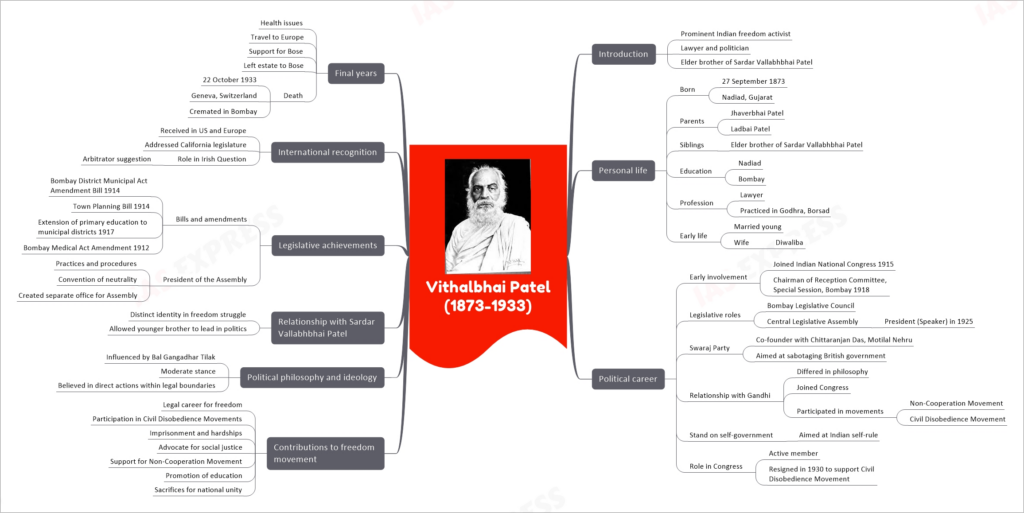Vithalbhai Patel (1873-1933): A Life of Commitment to Freedom and Justice
This topic of “Vithalbhai Patel (1873-1933): A Life of Commitment to Freedom and Justice” is important from the perspective of the UPSC IAS Examination, which falls under General Studies Portion.
Introduction
Vithalbhai Patel, an influential figure in India’s struggle for independence, stands out as a notable leader whose contributions significantly shaped the nation’s political landscape. His life, intertwined with the broader narrative of India’s fight against British colonial rule, reflects a blend of legal acumen, political foresight, and unyielding dedication to the cause of freedom.
Personal Life
Birth and Family
- Born: September 27, 1873, in Nadiad, Gujarat.
- Parents: Jhaverbhai Patel and Ladbai Patel.
- Siblings: He was the elder brother of Sardar Vallabhbhai Patel, another prominent figure in the Indian independence movement.
- Education: Vithalbhai Patel received his education in Nadiad and Bombay.
- Profession: He pursued a career in law and practiced in Godhra and Borsad.
- Early Life: He married at a young age and had a wife named Diwaliba.
Political Career
Early Involvement
- In 1915, he joined the Indian National Congress.
- He served as the Chairman of the Reception Committee during the Special Session of the Congress in Bombay in 1918.
Legislative Roles
- Vithalbhai Patel was a member of the Bombay Legislative Council.
- He also served in the Central Legislative Assembly and became its President (Speaker) in 1925.
Swaraj Party
- He co-founded the Swaraj Party along with Chittaranjan Das and Motilal Nehru. The party aimed at sabotaging the British government’s efforts in India.
Relationship with Gandhi
- While he differed from Mahatma Gandhi in philosophy, Vithalbhai Patel eventually joined the Congress and actively participated in various movements, including the Non-Cooperation Movement and the Civil Disobedience Movement.
Stand on Self-Government
- Vithalbhai Patel advocated for Indian self-rule and played a significant role in the pursuit of this goal.
Role in Congress
- He was an active member of the Indian National Congress but resigned from the party in 1930 to support the Civil Disobedience Movement.
Contributions to Freedom Movement
- Legal Career for Freedom: Vithalbhai Patel used his legal expertise to further the cause of Indian independence.
- Participation in Civil Disobedience Movements: He actively participated in various Civil Disobedience Movements, facing imprisonment and hardships.
- Advocate for Social Justice: Vithalbhai Patel was known for his advocacy for social justice and equality.
- Support for Non-Cooperation Movement: He extended his full support to the Non-Cooperation Movement initiated by Mahatma Gandhi.
- Promotion of Education: He believed in the importance of education and promoted it as a means of empowerment.
- Sacrifices for National Unity: Vithalbhai Patel made significant sacrifices to strengthen the unity of the nation.
Political Philosophy and Ideology
- His political ideology was influenced by Bal Gangadhar Tilak.
- He adopted a moderate stance and believed in achieving goals through direct actions within legal boundaries.
Relationship with Sardar Vallabhbhai Patel
- Vithalbhai Patel maintained a distinct identity in the freedom struggle, allowing his younger brother, Sardar Vallabhbhai Patel, to lead in politics.
Legislative Achievements
Bills and Amendments
- Vithalbhai Patel was instrumental in the passing of several important bills and amendments, including:
- Bombay District Municipal Act Amendment Bill 1914.
- Town Planning Bill 1914.
- Extension of primary education to municipal districts in 1917.
- Bombay Medical Act Amendment 1912.
President of the Assembly
- During his tenure as the President of the Central Legislative Assembly, he introduced various practices and procedures.
- He upheld the convention of neutrality and ensured a fair and balanced approach.
- Vithalbhai Patel played a crucial role in establishing a separate office for the Assembly, streamlining its functioning.
International Recognition
- Vithalbhai Patel received recognition not only in India but also internationally.
- He addressed the California legislature in the United States.
- He played a significant role in addressing the Irish Question and even made suggestions as an arbitrator.
Final Years
- In his final years, Vithalbhai Patel faced health issues, which led him to travel to Europe for treatment.
- He extended his support to Subhas Chandra Bose in his quest for India’s independence.
- In a remarkable act of generosity, Vithalbhai Patel left his estate to Subhas Chandra Bose to further the cause of independence.
- Death: Vithalbhai Patel passed away on October 22, 1933, in Geneva, Switzerland, and was cremated in Bombay.
Conclusion
Vithalbhai Patel’s life exemplified unwavering commitment to the ideals of freedom, justice, and self-rule. His contributions to the Indian independence movement, his legislative achievements, and his international recognition underscore his pivotal role in shaping India’s history. Vithalbhai Patel’s legacy continues to inspire generations in the pursuit of a free and just India.


